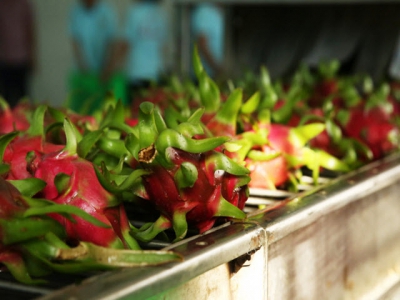Dragon fruit with planting area code conquers the export markets

My Tinh An cooperative’s members stabilize production and increase income, effectively contributing to the construction of a new countryside in the locality.
Dragon fruits of My Tinh An cooperative are exported to many markets require the planting area code.
Producing under the GlobalGAP standards in addition to be granted planting area code soon help a cooperative in Tien Giang province to export its dragon fruit to many demanding markets.
That is the case of My Tinh An cooperative, which is established in 2009 with its main works are producing, trading, packaging, exporting dragon fruit and others agriculture products. Besides that, My Tinh An cooperative also distributes agricultural materials and provides gardening services.
By this time, My Tinh An cooperative has 100 members, owns more than 120 hectares for producing. The cooperative applies clean agricultural production processes according to GlobalGAP standards in all the producing area.
Mr. Van Tan Phuong, Deputy Director of My Tinh An cooperative, says: From 2014, My Tinh An cooperative began applying clean agricultural production processes, helping and asking all the members to produce dragon fruit under the GlobalGAP standards. To the beginning of 2015, My Tinh An cooperative was granted GlobalGAP Certificate by the authorities to all the area growing dragon fruit. That result helps My Tinh An cooperative successfully conquering the demanding export markets. The cooperative’s dragon fruits are highly appreciated and accepted by consumers where ever they appear.
Before being granted planting area code, the dragon fruits of My Tinh An cooperative were only exported to European and some Asian markets. Their products could not be exported to the US and Australia as those markets require planting area code for import agriculture products
To open more markets, since 2015, My Tinh An cooperative applied for planting area code at the Post-import Plant Quarantine Center II.
Received documents from My Tinh An cooperative, Post-import Plant Quarantine Center II gave instructions to the cooperative and sent oficers thoe help them ways to work out the administrative procedures. Post-import Plant Quarantine Center II also sent officers to recognize the planting area and monitor the cooperative’s works, such as applying clean agricultural production processes, particularly the planting memo.
According to the regulations, My Tinh An cooperative has to keep the planting memo carefully to serve the accessing of origin when ever they are required. They also have to monitor pest status regularly; implement good garden hygiene; implement measures to cultivate, control harmful pest and harvest to ensure that the density of harmful organisms is always at a low level and there are no residues of pesticides exceeding the acceptable threshold according to regulations of the relevant ragulations of importing countries, as well as other requirements.
As the palnting areas of My Tinh An cooperative had met GlobalGAP standards in production processes, plus the practical help and guidances of officers from the Post-import Plant Quarantine Center II, My Tinh An cooperative did not face many difficulties. Those works resulted in the acceptance of the Post-import Plant Quarantine Center II to grant the planting area code to My Tinh An cooperative timely.
With the planting area code granted, My Tinh An cooperative began to export dragon fruits to the US and Australian markets, helping the cooperative's export markets to be more diversified, the cooperative's reputation for dragon fruit planting areas was enhanced, customers were multipled. Since then, cooperative’s members stabilize production and increase income, effectively contributing to the construction of a new countryside in the locality.
According to Mr. Phuong, in recent years, the management and maintenance of planting area codes has always been of great interest to the cooperative. The Post-Import Plant Quarantine Center II has also established regulations and has worked closely with the cooperative. Particularly, when the cooperative has an association with any enterprise for export, the cooperative must make a certificate with the content that the cooperative provides goods with a specific quantity and type as well as agreeing to that business use the planting area code, and then sent to the Post-Import Plant Quarantine Center II. On that basis, the Post-Import Plant Quarantine Center II will confirm the shipment is eligible for export.
My Tinh An cooperative does not allow any enterprise that does not associates with the cooperative to use planting area code. This work is monitored by the Post-Import Plant Quarantine Center II and the Center sends technical officers to the cooperative to review regulations yearly.
The plant quarantine authorities of the importing countries also periodically or irregularly inspect the cooperative's growing areas, if there is any mistake, immediately request corrective actions.
All those works help the cooperative to manage well and maintain the planting area code in accordance with the regulations until today.
Related news
 VN, Netherlands to boost agricultural co-operation
VN, Netherlands to boost agricultural co-operation Dutch businesses have shown interest in Việt Nam’s agriculture sector in general and the vegetable processing industry in particular as the industry has grown
 Seminar talks fruit, veg exports
Seminar talks fruit, veg exports Việt Nam’s fruit and vegetable exports are expected to top US$4.5 billion by 2020, with fruits accounting for $3.6 billion
 Vietnamese fruit could face trade barriers in Chinese market
Vietnamese fruit could face trade barriers in Chinese market China has become more fastidious about fruit imports, setting high requirements similar to those applied by the US and Australia.
 Ireland to assist Hanoi to develop hi-tech agriculture
Ireland to assist Hanoi to develop hi-tech agriculture Ireland will provide more technological assistance for Hanoi to improve agricultural product quality and ensure food safety
 Vietnam’s fruits, vegetables entering strict markets
Vietnam’s fruits, vegetables entering strict markets The United States also opened the door to Vietnamese mangoes late last year with the first mangoes expected to enter the market next month.